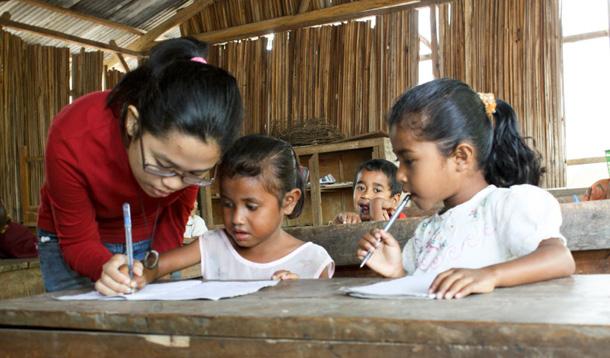
World Vision is asking the Canadian government to help girls in developing countries stay in school longer so marriage isn’t the only option for survival.
My sons have been privileged to each have a close female friend. I love to hear Julia and Sophie talk about their interests, their travels, their dreams for the future. I don’t think I’ve heard either one mention marriage—and at the ages of seven and 11, that’s exactly as it should be.
Flash forward a few years to their mid-teens. That’s when many girls in Canada are listening to music, joining school clubs, perhaps heading out on a first date.

Contrast this with the lives of many girls in the least developed countries where, by age 15, one in every nine girls is already a wife. My World Vision colleagues have met girls as young as eight who have been sold into marriage.
A girl in this situation doesn’t collect music on iTunes—she’s probably gathering firewood long before dawn. She doesn’t nuke leftover spaghetti for an after-school snack—she cooks three meals a day, possibly for a large extended family. Perhaps most disturbingly, she doesn’t babysit the neighbors’ kids—she looks after her own children. A young body barely through puberty is forced to withstand the pain of forced intercourse and the dangers of multiple pregnancies and childbirths.
It’s easy to leap to criticism of parents who sell their daughters into marriage. Or we can shrug our shoulders and dismiss it as a ‘cultural practice.’ But consider this: forced marriage happens mainly in families who are desperately poor. Girls in countries facing humanitarian crises—civil war, floods, famines and the like—are the most vulnerable of all.
In Lebanon, World Vision staff met a twelve-year-old girl named Sheereen, whose mother is considering selling her daughter into marriage.
“Sheereen would be our survival,” said her mother, referring to the family’s situation as refugees of the brutal conflict in Syria. Many parents have so few options for keeping their children alive that they will make heartbreaking choices to do so.
When asked how she felt about being married, beautiful Sheereen covered her face and sat in silence. There were no words.
“Do you ever dream about your future?” my World Vision colleague asked her. Sheereen’s mother answered for her. “She doesn’t answer you because no one has ever asked her before.”
On the eve of International Women’s Day on March 8, World Vision released a report called Untying the Knot: Early Marriage in Fragile States, shining a light on the links between conflicts or natural disasters and child marriage. We’re calling on the Canadian government to help protect these girls from an early age through:
To learn more, visit www.worldvision.ca
![]() Learn how to buy ethical chocolate
Learn how to buy ethical chocolate
![]() Read how Erica is teaching her children about human rights
Read how Erica is teaching her children about human rights
![]() Check out Erica's post about how dirty a child's work can actually get
Check out Erica's post about how dirty a child's work can actually get
![]() Learn about the sad state of children and human trafficking from Carleen McGuinty
Learn about the sad state of children and human trafficking from Carleen McGuinty
Visit World Vision’s End Child Slavery campaign at endchildslavery.ca.

